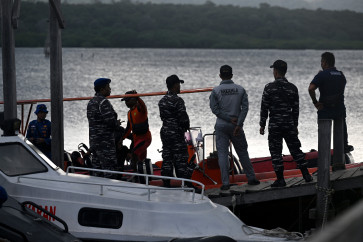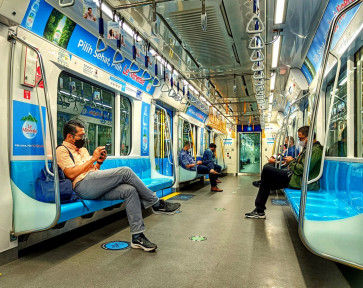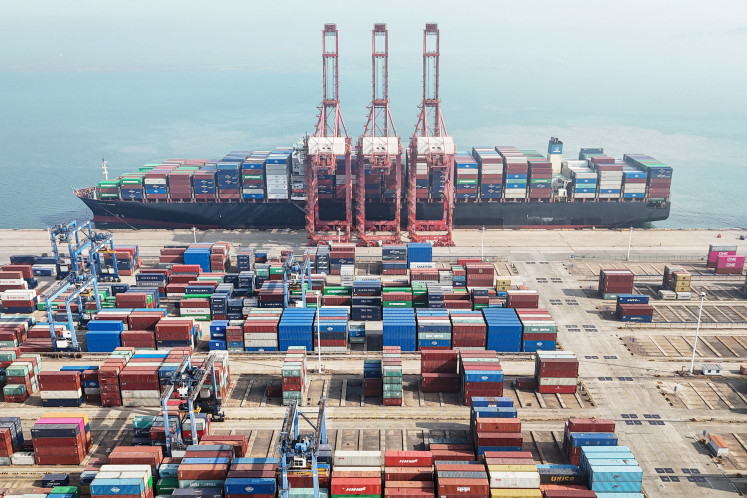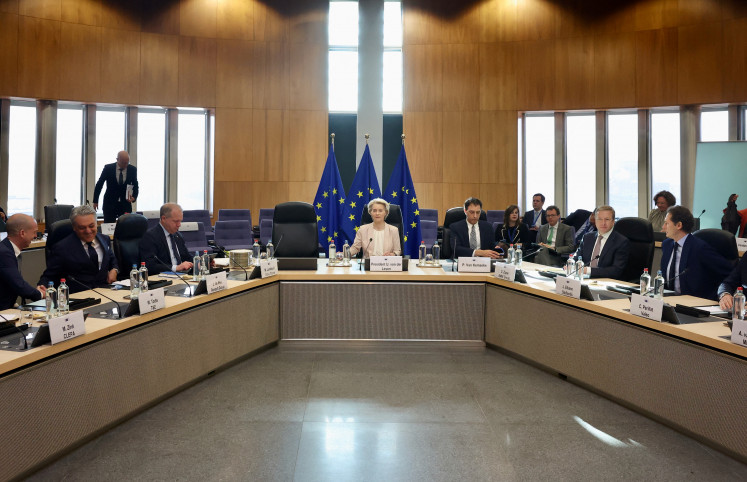Popular Reads
Top Results
Can't find what you're looking for?
View all search resultsPopular Reads
Top Results
Can't find what you're looking for?
View all search resultsIndonesia a dream market: Allianz banks on increased awareness of protection amid pandemic
The Jakarta Post’s Riska Rahman and Prima Wirayani talked with Allianz Indonesia country manager and CEO Joos Louwerier via Zoom in late July to discuss how the pandemic has affected the insurance industry.
Change text size
Gift Premium Articles
to Anyone
T
he coronavirus pandemic has changed most aspects of life, including how people interact and protect themselves and their family members amid the uncertainty of the health crisis. The insurance industry is no different as its players work to change their business approaches and products to adapt to the changes.
Several players, including Allianz Life Indonesia, have reported that they faced difficulties in selling their products amid the movement restrictions implemented to curb the virus spread, despite seeing rising awareness of the importance of insurance among the public.
The Jakarta Post’s Riska Rahman and Prima Wirayani talked with Allianz Indonesia country manager and CEO Joos Louwerier via Zoom in late July to discuss how the pandemic has affected the insurance industry, Allianz’s strategies to weather the crisis and the company’s future post-pandemic. Here is the excerpt of the interview.
Question: Can you give us insights on the challenges the insurance industry has faced during this pandemic?
Answer: The earlier months of the pandemic were a challenging period because it was harder to sell insurance as we could not meet the customers and they may have been reluctant to meet with us, too.
Like many of our peers, we have worked very hard to overcome this challenge by developing the right products. We have also focused more on protection, hospitalization and critical illness products.
We have also developed the Allianz eAZy Cover for virtual selling and helped our agents with using a methodology to approach customers and explain the need for protection. We anticipated the changes and that resulted in sales picking up quite nicely.
I agree with my colleagues in the industry that it has been quite challenging. However, with the right measures, we think we can still grow.
What is the industry’s potential in Indonesia and how does it compare with other countries in Southeast Asia?
I think the potential is huge. I often say to my colleagues and to anybody working in insurance in Indonesia that this is the dream market because of the very low insurance penetration rate of about 3 percent to gross domestic product (GDP). The opportunity also lies in the fact that a lot of people simply do not have insurance and are not familiar with it.
That also comes to the point that we as insurance companies have a huge responsibility in Indonesia to explain what insurance is, to make it easily accessible to the public and to increase the financial literacy rate, which according to the Financial Services Authority (OJK) is about 18 percent. That has to increase and we have to work together to do that.
Considering the low penetration of insurance in Indonesia, in your view, why are Indonesians unaware or reluctant to buy it for themselves?
Many people believe that they do not need insurance because they have their families or communities to help them. But if they do not have that kind of protection, people will start to feel the need to be protected by an insurance company. That is where we come in and explain insurance in a very simple and comprehensive way. I think the OJK, the government and insurance industry players have all worked very hard to educate various groups of the population about insurance and we have to continue to do so.
However, the biggest jump in insurance awareness was actually made by the Health Care and Social Security Agency (BPJS Kesehatan). The penetration of BPJS Kesehatan has been quite significant in a short period of time and that has made people more aware of insurance in one way or another.
Recently we have seen many cases that have harmed the reputation of the insurance industry, like with state-owned PT Asuransi Jiwasraya and Asabri. How have these cases affect Allianz?
Allianz has always been committed to maintaining our customers’ trust in regards to managing their funds and their unit-linked products. We rely on our expertise to always optimize the investments and returns. We remain very prudent in designing our products and also in maintaining our asset portfolios. We explain the products to customers and also how we take care of customers’ money in unit-linked portfolios.
I hope these cases will result in the industry becoming more mature and that regulators will take the right steps to avoid this happening again in the future. We are working with the industry and with the regulators on this together.
Can you explain to us what types of insurance have gained in popularity for Allianz, especially during the pandemic, and how has client acquisition fared so far?
Traditional protection products have gained quite a bit in popularity because of COVID-19. People are looking at hospitalization and critical illness insurance, so we have seen a significant increase there. Our unit-linked insurance products, however, still remain our most dominant products.
We have seen a significant increase in numbers for our health and life insurance this year, driven by the COVID-19 pandemic. In the first quarter of 2020, Allianz Life saw a 27.6 percent increase in weighted new business premiums, far surpassing the average market growth that dipped 4.4 percent. Allianz Life also recorded a 21.2 percent increase in its total weighted premiums, which exceeded market growth that dropped 1.3 percent from the same period of 2019.
If you ask me about the projection for this year, we think this has been a tough year for the whole industry, but we believe we can grow despite the crisis. We saw a huge opportunity for growth in the first quarter and we think we can continue that growth over the entire year.
What are your strategies to grow your business in terms of the number of policyholders and premiums?
We embarked on a digitalization journey three years ago in which we are very aggressively re-shaping our processes and our systems to make sure that customers can access us in a very convenient way and that our agents are digitally-enabled as well.
We want to make it easier and very simple for people to purchase our products, not for them to have to go through endless documents, but to make it easy to understand and process.
We also want to partner with our ecosystem partners such as Gojek, Bukalapak, Halodoc and also Home Credit to make customers more aware of the need for insurance and to make it easier for them to purchase those products.
Experts expect more work will be done virtually after the pandemic. How do you think that will affect your company and the workflow of your staff?
I think all industries, not just insurance, have seen huge changes. I do not think this will completely change after COVID-19 because it can improve efficiency, as we have all seen from the benefits of working online.
At Allianz group, we are quite aggressive about this. We think that in the future, we will not go back to 100 percent working at the office. It will be probably around 60 percent work in the office and 40 percent work from home, even after COVID-19.
As for our agents, we plan to increase their numbers in the future because I expect that digitization will make it easier for agents to get on board. I expect that COVID-19 will result in growth in the number of agents in the industry and also for Allianz.










